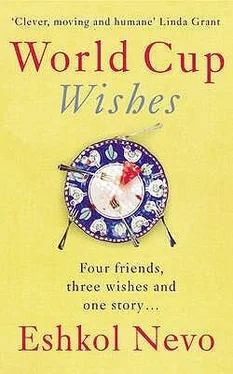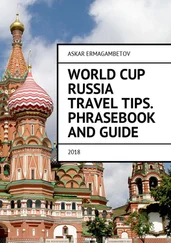But what exactly will we say to those rich Jews when we meet them? Amichai asked.
That’s easy, Ofir asserted. You tell them your own personal story. That always works. And then there’ll be a presentation that I’ll write …
And I’ll translate, I said, finishing the sentence.
But what’ll the presentation say? Amichai persisted. I mean, what’ll it be about?
We scratched our heads in puzzlement. More accurately, each of us scratched the place he scratched when he was stumped: I scratched my cheek. Amichai his upper neck. Ofir his curls.
Where is Churchill when you need him? the question ricocheted from one mind to the other. He would know how to turn our muddled, general ideas into a coherent, reasoned plan.
*
Churchill was busy. Very preoccupied with ‘one the most important trials in Israel’s public history’, as described by Michaela Raz, the legal correspondent for TV’s major channel. Every once in a while, his face would flicker in one of her reports, and black-and-white drawings of him, with an unflattering emphasis on his wide nose, appeared in the financial papers,
It was very hard to get him on the phone. And when he did answer, he was always in the middle of something. Or a minute before something. And always in a hurry to end the conversation. So I decided to take action, to go to his office and grab him by his starched collar and issue him an injunction: habeas your corpus down here, your friends need you.
When I arrived at the prosecutor’s office — it took me an hour to find the entrance, which was squeezed in between dark buildings as if someone were ashamed of it or wanted to appear unassuming — I was told he was not in his office. I learned from a more thorough enquiry that at that very moment he was making a court appearance in his big case. That didn’t stop me, and I walked quickly to the court, a few pedestrian crossings from there, determined to ambush him when the session was over and let him know just what I thought of the way he was treating Amichai.
I had never been in the temple of justice before, and in the first few seconds after I went into the entrance hall with its very high ceiling, I felt guilty. Very guilty. I wasn’t sure what my crime was — perhaps the ’90 World Cup in Nablus? — but as I stood there, I had the strong feeling that in another minute a lawyer would come and ask me politely but firmly to accompany him to my hearing.
No one came up to me. Dozens of people crossed the hall from all sides, diagonally or in a zigzag. Walking. Walking rapidly. Running. Some of them were moving so fast that I was afraid they’d trample me. Others limped. In fact, many limped. One leaned on a cane. One clutched his waist. A third dragged a recalcitrant leg. I had never noticed before how few people walk straight. Some were dragging small suitcases on trolleys — only later, when I went into the courtroom itself, did I realise that that was how legal documents were transported — but the suitcases didn’t lend the place an air of foreign travel. Just the opposite. There was something very local, very Israeli about that entrance hall. The expression on the lawyers’ faces was one of urgency. And on the faces of the ordinary people, the workers, the ones who weren’t lawyers, there was an expression of restrained Israeli concern. A few metres from me, near one of the large columns in the centre of the hall, was a sculpture of hands spread open to the sky. I moved closer and saw that the name of the sculpture was ‘Senna Bush’. I never thought of a bush as something that could feel pain. Someone standing near the bush was yelling into his mobile: ‘I can’t trust him any more!’ And then he yelled, ‘He’ll pay for this.’ The thought passed through my mind again that ‘he’ was me. And that I would pay for my original sin. A woman passing behind me, her high heels clacking rapidly, said, ‘It would be much easier for them to turn over from their stomachs to their backs than from their backs to their stomachs.’ As far as I could tell, she was talking to herself. I looked to the right and to the left. I didn’t know which way to go. Where was my hearing? Or where could I find Churchill here? So I did what he would have done and went up to the prettiest woman in the place, a young, lawyerly-looking attorney whose white blouse perfectly suited her chocolate skin. She knew immediately what I was talking about and said that Churchill’s trial was being held in Judge Dovev’s court. District court.
District court? Where’s that? I said in alarm. ‘District’ sounded like a grey building near the Tzrifin army base.
It’s here, third floor, on the right, she said reassuringly, and pointed me to the lift.
*
Churchill didn’t notice me entering the courtroom.
I sat down quietly in the last row, next to the wall.
He was speaking. His normally broad back looked broader under the robe, and his arms were spread to the sides like large, eagle-like wings. I tried to follow the discussion, something about a certain document that Churchill claimed was admissible by virtue of its existence, but not as evidence. Or the opposite. After a few minutes, I gave up trying to understand the big picture and started trying to grasp the small details: the way Churchill responded and lowered his voice to add authority to his words, or repeated the same word over and over and over again, or suddenly asked rhetorically: what are we talking about? The way he touched his finger to his tongue before he turned a page, a gesture he had copied, simply copied, from Ya’ara, and how phrases like ‘ actus reus ’ and ‘derivative liability’ and ‘a priori’ were suddenly interspersed into his speech. Though I had never heard him use them when we watched football together, he didn’t sound phoney or as if he were trying too hard because under all those beautiful words and gestures you could feel the quiet, inner conviction I knew so well from arguments in our group, an inner conviction that left the listener with no alternative but to submit, or at least to doubt, for one fateful moment, the rightness of his own view.
The defence attorney at his right rubbed his chin in confusion, as if he were wondering how to deal with the cascade of words Churchill had thrown at him, and with the slightly amused, slightly condescending tone in which they were spoken, and perhaps he was already regretting his choice of profession, and he was probably regretting having underestimated this young attorney, thought by everyone to be too young for such a case. That’s what the court reporter, who was sitting at the foot of the judge’s raised table, must have thought, and perhaps that’s why her eyes were focused on Churchill, especially on the way his neck muscles expanded when he spoke, and she lost concentration for a few seconds and didn’t notice that she had to insert more paper, and the judge reprimanded her and asked Churchill to wait for her to insert the paper, and Churchill said, yes, Your Honour, of course, Your Honour. Then he looked away and his eyes caught mine for a moment. A fraction of a moment. Then went right back to his papers. He didn’t smile at me. Didn’t say hello. Of course not. He wouldn’t let anything get in the way of achieving his goal. He’d known he wanted to be a lawyer from the time he was in high school. And after a year in the army, he’d wrangled a transfer to the intelligence base at Gelilot so he could have time to polish his Hebrew by writing intelligence reports and also take some night courses in law at the Open University. Yes, while we were eating stones in Nablus, he was accumulating credits for his bachelor’s degree and sleeping with half the girls on the course and, naturally, with the woman lecturer too. Then he was accepted into the Tel Aviv University Law School, like he wanted. And he graduated on the Dean’s List, like he wanted. And arranged to intern at the prosecutor’s office, like he wanted, and perhaps — the thought passed through my mind — it was because of that sense of mission that drove him, and not only because of Ya’ara, that I was secretly jealous of him and wished, as I watched him, that he would flounder in the middle of his speech, that he would stumble, that he would fall.
Читать дальше












